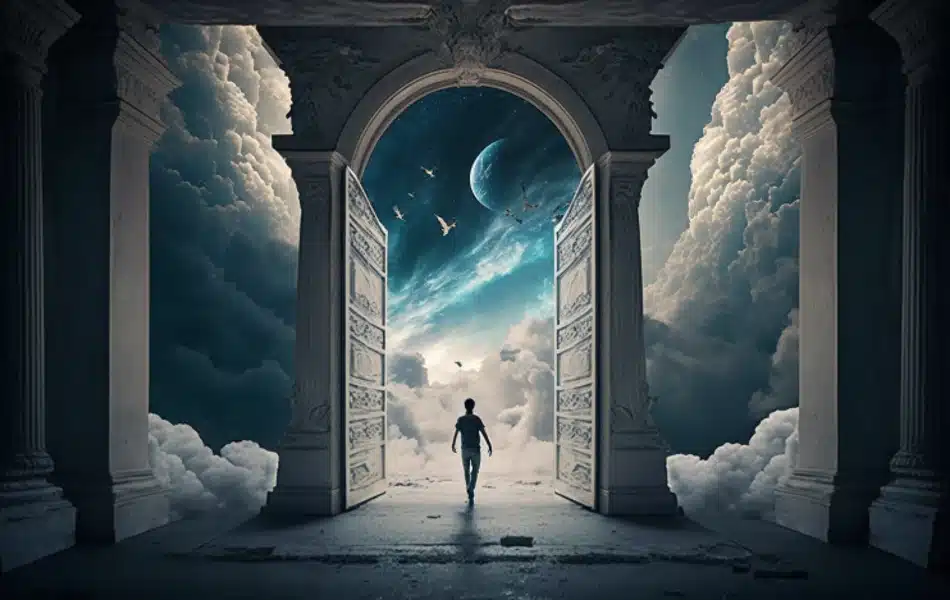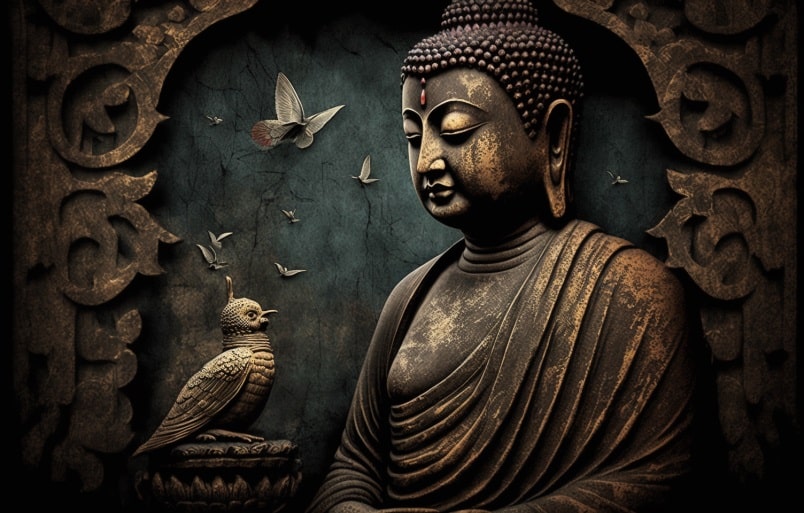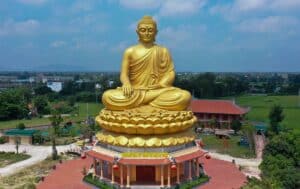According to the definition of religion on Wikipedia, Buddhism is not a religion as people think. Buddhism does not accept that there is a force, power, god, ritual, custom, that can determine our destiny.
Therefore, Buddhism does not have any ritual practices that show an attitude of trust towards certain powers and forces. Buddhism does not require blind faith from its followers. Therefore a mere belief cannot have a place. Instead, trust is based on understanding.
It is a unique phenomenon in the history of human consciousness. No one can be compared to the Buddha. He said that a supreme being is nothing but a search for comfort, safety, and a place to lean on. You believe in a supreme being not because there is one, but because you feel weak without that belief. Even if there were no supreme being, you would create one. That belief arises from your weakness. It is a projection.
According to Buddhism, everything operates according to the Law of cause and effect. Because we sow causes are intentional actions (karma) in the past that we will reap results in the present or future; Similarly, intentional action in the present will produce results in the future.
Buddhism does not believe in a Supreme being

Human beings often feel limited, helpless, as if victims of circumstance, because they do not know where they came from, where they are going, or why they are here. Without a supreme being, it is difficult for ordinary people to find meaning in life; they become confused in the absence of the shadow of a supreme being.
Supreme being is the support, comfort, and protection for you. They assure you, ‘Don’t worry. The supreme being is omnipotent and omniscient and knows why you are here. They are the creator. They know why they built the heavens and the earth. You may not know, but they know, so you can trust in them.’ That helps you be at peace. Just an idea of a supreme being is enough to make you feel at ease – that you are not alone, that you are cared for, and that the universe is not chaotic, but is in order.
The Lord of the Universe worries about everything, and even a hair falling from your head is not beyond their divine will. Everything is planned. You are a part of a grand scheme.
Perhaps you may not understand the meaning, but the meaning must exist because the supreme being exists. The supreme being helps you live happily. You can believe that life is not random, that there is some meaning, some salvation. The supreme being helps you feel secure. But Buddha said that there is no supreme being; it is evidence that you do not know why you are here; it speaks of your helplessness.
It proves that there is no meaning at all. The idea of God was created to help us get through this meaningless life. Imagine you are on a plane and someone says, “There’s no pilot.” Suddenly, everyone panics. No pilot?! Without a pilot, you’re doomed. Then someone says, “This plane doesn’t need a pilot because it’s remote-controlled. Otherwise, how could it fly?
Because everything runs so smoothly, there must be a pilot. We may not see the pilot, we may not be lucky enough to see them, we may close our eyes, but there must be a pilot.
Otherwise, how could it fly? It’s already taken off, and it’s flying smoothly, and the engine is running smoothly. That’s the evidence of the pilot.” If it’s proven like that, you can relax in your seat. You close your eyes and let your mind wander in emptiness and snore like a log. There is a pilot, and you don’t have to worry about anything anymore. Buddha said there is no pilot; it’s just a human invention.
Humanity shaped God in its own image. God is an invention, not a discovery. Therefore, God is not the truth; it’s the greatest trickster. That’s why I say Buddhism is not a religion in the usual sense.
Buddhism is a non-theistic religion. Can you imagine? The first time Western scholars studied Buddhism, they were shocked to call it a religion without God. They only knew Judaism, Christianity, and Islam.
These religions, in many respects, are very inferior to Buddhism. Buddhism is a mature religion. Buddhism is the religion of superhuman souls. Buddhism is not a religion for children, and it does not encourage any desire for your children. Buddhism is very indifferent.
Let me repeat: no one is more compassionate than the Buddha, but his doctrine is very indifferent. In fact, that indifference speaks of his compassion. He does not allow you to cling to any deceit. No matter how comfortable it is, deceit is still deceit. Those who deceive you are not your friends, but your enemies. Because nourished by deceit, your life is full of deceit.
You must live in the atmosphere of truth, no matter how difficult or bitter it may be. Even if you have to suffer for truth, it is worth it.
The Buddha said that human religions are creations of human beings. You are influenced by objective circumstances. You must accept the truth at any cost without covering it up, polishing it, or distorting it to fit your interests. If that causes turmoil and disorder for you, be prepared to accept all consequences. If you are injured by self-esteem, be willing to die for that injury. If destroyed for the truth, be willing to be destroyed.
The Buddha is very indifferent, but he has opened the immeasurably deep mystical gate that no one else has succeeded like him. He does not allow any of your ambitions. He says, “Be more conscious. Be more awake. Be more courageous. Don’t hide behind any faith, belief, or theory. Take responsibility for yourself.”
Light your inner candle to see the true nature of everything. And when you have enough courage to accept the truth, you are truly blessed. That is the first teaching of the Buddha. He taught that all religious systems are harmful; all beliefs are barriers.
He is not a believer, nor is he an atheist, because as he said, some believe in God, and some do not, but both have faith. He does not believe in God, but he rejects all the views of those atheists. He said that their denial of God is no different from a mosquito biting an elephant’s foot. If you are not mature enough, you will find another idol to replace God. For example, Karl Marx claimed that there is no God, yet his history contains all the concepts of God.
What do human beings need God for?

God is the determining factor, the element behind every phenomenon. God decides what will happen, and what will not happen. Marx completely abandoned the idea of God, but history became the determining factor. History became destiny.
History governs everything. What is history? Marx said that communism is a historical necessity, and history has decided that communism will win, and everything has been predetermined by history. So history has become a super God. A character or factor has to be there to make decisions.
Humans cannot live with a direct reality. Humans cannot accept a chaotic and accidental reality. Humans cannot live with reality without relying on an idea to give it meaning, relevance, and continuity so that the mind can understand and analyze it, and cause and effect can be distinguished.
Freud completely abandoned the idea of God, but the unconscious became God; all human activity is determined by the unconscious; humans are just puppets in the hands of the unconscious. That is a new brand of God. That is the mythology of modern times. Freud’s psychology is a new mythology of God.
The bottle may be old, but the wine is new. The brand has been changed. The old brand has been removed, and a new coat of paint has been applied to deceive the unwary. But if you analyze Freud’s psychology carefully, you will immediately realize that the unconscious plays the role that God once did.
How come human beings need a God?
God must have been created to decide something … history, economy, the unconscious, natural selection … If humans cannot have freedom, then changing mythology, ideology is useless.
Whether it’s Hinduism, Islam, Christianity, Judaism… they only differ in form. Your mind is still childish, still immature. You constantly search for the image of a father figure or a certain character, in order to explain everything, in order to have the ultimate answer.
A mature soul does not seek, whether or not there is an ultimate answer. That is why the Buddha said, “I am not a metaphysician.” He has no metaphysical doctrine. Metaphysics means the ultimate answer to all questions.
He did not say, “I have explained that mystery.” He did not say, “Here, I have revealed the truth to you.” He said, “The only thing I can do is encourage you, make you aspire, help you become alert, aware, vividly alive, so that you can live your life fully conscious, full of light and wakefulness, to the extent that all questions dissolve.”
It is not that you will find the ultimate answer to life – no one has done that. The Buddha completely rejected metaphysics. He said that metaphysics is only a useless search.
Buddhism does not believe in the existence of Heaven

The Buddha said, “Your heaven is nothing more than unfulfilled desires, unrealized instincts, and projecting those desires and instincts into the invisible realm of the afterlife”. At this point, he is absolutely right.
If you were to describe the heaven of Islam, Christianity, or Judaism, you would immediately understand why he said that. What is not fulfilled in this life, you will project into the afterlife.
But whether in this life or the next, those desires are no different. The Indians speak of miraculous trees called kalvrasksha. If you sit under the tree, whatever you want will happen immediately. The West recently invented instant coffee.
India has been thinking about miraculous trees for thousands of years, and everyone believes. If you sit under that tree, you can pray and see your wishes come true. If you dream of a fairy, she will appear. Want delicious food? You get it right away. Everything you want is granted.
Just a rough analysis shows that hardly anyone achieves their desires in life, and everyone spends their whole lives pursuing their dreams. Yet, are they satisfied with what they have achieved? Therefore, they project their desires into the future. Desires cannot be satisfied by their nature, whether in the present or the future.
The Buddha said, “The nature of desire is that it cannot be satisfied. No matter what you do, you will never be content – that is the inherent nature of desire”. Desire cannot be fulfilled. Even if you sit under a miraculous tree, you still cannot be satisfied. Many times you may be satisfied with the things you desire, but then you desire something else.
This cycle continues endlessly. The heaven of Christianity, Islam, Judaism, and Hinduism are only projected desires, unfulfilled desires, and disappointed dreams.
Of course, they comfort people a lot: “If you cannot be satisfied here, you will be satisfied in heaven. Sooner or later, you will return to God. The only requirement is that you pray and trust in Him. Fear God, and your reward will be immense.” The reward, of course, must be awaited until the next life, because the deceitful monks cannot deceive you in this life.
They know that desires cannot be satisfied, so they have come up with the idea of the afterlife. No one knows anything about the afterlife, so people are easily deceived. If someone tells you, “God will satisfy your desires now and right away,” it will be difficult to prove because no one has ever been satisfied now and right away.
So then God will be unmasked. That’s why they have to come up with a very cunning trick. They say, “You will only get it in the next life…” Why can’t your all-powerful God satisfy your desires right now?
Can’t your all-powerful God create a miraculous tree right here on earth? Can’t your God do anything while people are still alive? If he can’t do anything now, how can you guarantee that he will be able to do it in the next life?
Buddhism says that the nature of suffering is desire

The Buddha said, “Look at the nature of desire. Observe the movement of desire, for it is very subtle. There are two things you will realize.
- First, desire by its very nature cannot be satisfied.
- And second, when you understand that desire cannot be satisfied, it will disappear and you will no longer crave. That is a state of peace, stillness, and clarity. That is a state of satisfaction. Desire cannot be satisfied by more desire.”
It can only be satisfied by transcending satisfaction. Desire is a golden opportunity to understand the workings of the mind, how it operates with its mechanism. And when you understand that, there is a transformation. Desire will disappear without a trace. And when there is no longer desire, no demand, you will be satisfied. Not that desire is satisfied, but when you go beyond all desires, satisfaction happens.
Desire changes with time and circumstance. Religion says, “Desire can be satisfied in heaven.” Capitalists say, “Desire can be satisfied in this world.” Materialists say, “Desire can be satisfied here.”
Capitalism says, “You can achieve your desires if you try your best.” The West is currently doing this: “Fight, seize, and win by any means necessary. Acquire more wealth, gain more power.” This is what politicians everywhere are doing. “If you want happiness, the economy must develop, productivity must be high.” This is what scientists say; they say that with a little more technology, paradise will be established.
What does your religion say? They say nothing different. They say, “Desires can be satisfied, but not in this life, in the afterlife.” That is a very small difference between materialists and moralists. For the Buddha, both are materialists, and for me, both are materialists. Moralists and atheists are all fish of the same school, with no difference at all.
Their attitudes and approaches are identical. The Buddha said, “Desires are never satisfied.” He was saintly in that sense. You must understand the nature of desire. It cannot be satisfied here, or anywhere else.
That has not happened and cannot happen, because it contradicts the essence of desire. What is desire? Have you ever observed your own greedy mind? Have you thought about it? What is desire? You want to buy a house so you have to work hard to get it.
You sacrifice your whole life for it. When you have a house, are you satisfied? When you have a house, suddenly you need many other things. Then you want a bigger house. You want to be loved, and when you are loved, you want someone else. That is the nature of desire. It always comes before you. Desire belongs to the future.
Desire is a hope. Desire can never be satisfied, because its nature is a projection into the future. It always lies on the horizon that you cannot catch up with; every time you move forward, it moves backward, and the distance between it and you remains the same. When you have ten thousand, you will want twenty thousand. When you have twenty thousand, you will want forty thousand. The distance never changes.
Whether you have it or not, desire always wriggles ahead. Buddha said, “Abandon hope, get rid of desire.” When there is no hope and no desire, you are thrown into the present. When you no longer crave anything, you will be content, because desire no longer pushes you around. Therefore, when Buddha said there is no difference between the hypocrites and the materialists, he made the people of Bala angry. They had never been so angry with anyone.
They tried to destroy his teachings in India, and they succeeded. Buddhism appeared in India but disappeared from India, because Hinduism is one of the most mystical religions in the world.
If you open the scriptures of the VeDa, you will immediately see prayers, rituals, and offerings, all of which are requests and pleas, from one god to another. Every ritual is driven by desire. “Please grant us more, much more. Let there be a good harvest and favorable weather, let us prosper in our work, let us be healthy and live long…”
The VeDa scriptures are nothing but amplified desires, sometimes even ugly ones. The Ve Da is not just about requests, it also contains curses against enemies, such as “May my cow produce more milk and may the cow of that wretched person die, or at least not produce any milk.” What kind of religion is this?
Even calling it a religion is illogical. If this is the true religion, what kind of evil religion would exist? The Buddha learned from many teachers during his quest for enlightenment, but he always left them empty-handed because he knew that no one understood the nature of desire.
Even those teachers still had many desires. Of course, their desires were projected far into the future, into their next lives, but the object of desire was still the same. The only difference was time. Some desired things in this life, others desired things in the next.
But what’s the difference? There is no difference at all. They all desire the same thing. Desire is desire. The Buddha learned from many teachers, but he was always disappointed. He never met a truly holy person, only hypocrites.
They are people who torture themselves: some go without food for months, others stand for a whole year, others never sleep, and they become walking skeletons. You wouldn’t call them moralists or ordinary people. But if you look into their minds and ask, “Why starve yourself? What are you striving for?”
They will answer that it is to reach heaven, to go to paradise, to receive eternal reward after death. That is their desire. They all say the same thing, “Everything is impermanent. This life is just temporary. No matter what we achieve, in the end, death will take everything away.”
So why compete for anything? This life will not last forever. Therefore, we want to find eternal things, everlasting life, and absolute satisfaction. Only fools seek fame and fortune in this life because they will ultimately leave empty-handed. Even if we have a lot, we cannot take anything with us when we die. We want to find a treasure that we can carry with us, that will not be lost or stolen, that even death cannot take away.
Would you call these people saints? They seem worse than ordinary people; they are more materialistic than materialistic people. Of course, they are cleverly disguising their greed. Their greed seems to be transcendent but it is very deceitful. It’s like putting a few flowers on a pile of manure. Manure is still manure. Flowers can only fool the ignorant.
The Buddha was not fooled. He saw everything. He saw their greed. If you still have desire, you are a worldly and materialistic person. Therefore, he did not teach about heaven. He did not believe in any heaven.
It’s not that he didn’t believe in happiness, no. He believed in happiness, but that was not a religion. When all heavens are lost, when all desires have disappeared, happiness bursts from the deepest core of your being. It doesn’t require anything. No virtue, no suffering, no offering. Just understanding is enough.
Buddhism does not believe in the existence of the soul

The Buddha does not believe in the soul, does not believe in a supreme being, and does not believe in heaven. This may seem difficult to accept. We can accept that there is no supreme being because no one has ever seen him; it is very likely that this is a projection.
We can also accept that there is no heaven, because it may just be an unfulfilled desire of ours. But no soul? Then there is nowhere for you to hold on to. No soul? Then what is the purpose of human life? If there is no soul, if death is the end, then no matter how hard we try, it is useless. What is the purpose of meditation?
Is prayer useful? The Buddha said that the idea of self, of soul, has been misunderstood. You exist, but you have no self. You exist, but you are not separate from the universe. Separation is the basis of the concept of self. If I separate you, I have a self. If you separate me, you have a soul.
The Buddha said: “existence is one, there are no borders. No one is separate from others. We live in a sea of consciousness. We are one consciousness, but we are deceived by the separation of the body, fooled by the boundaries of the mind. And because of the body and mind, and because of the identification with the body and mind, we think that we are separate, we think that we are isolated “selves”. The ego is created by this.”
For example, if you look at a map, you will see America, but on the ground there is no America – only on the map of politicians. On the map, America and Africa are separated, but deep down, beneath the ocean, there is only one Earth. All continents are connected, they are just one Earth.
We are only separated on the surface. The deeper we go, the more the separation fades. When we reach the core of our being, suddenly it becomes one – there is no ego, no soul. The Buddha had no belief in God, in the soul, or in the afterlife. So what did he teach?
He taught a way of life, not a belief system. His method was very scientific, based on experience and practicality. He was not a philosopher, not a metaphysician. He was a practical person. The Buddha said, ‘You can change your life without a belief system.’
Indeed, those beliefs are obstacles to change. The first step is to abandon beliefs, abandon the supernatural, abandon doctrine. Start with zero, without philosophy, without consciousness. Start with a clean slate. That is the only way to come to the truth.
Truth about the Bibles

Buddha said that all of your bibles are just desires, instincts, greed, lust, and anger of yours. They are only creations of your mind, so they must bear the marks of the mind. Scriptures are created by humans.
Therefore, religions all try to prove that their bibles are not products of humans. Jesus Christ said that God is the author of the Holy Bible; the Ten Commandments were given directly to Moses by God; and the New Testament is the direct message of the Son of God. It is not a human creation.
It was proclaimed by God Himself. The Indians also say that the Vedas are not the products of humans. And the story repeats itself: Muslims say that the Koran was read to Mohammed by God. Why do religions say that their bibles are from God, but not those of other religions?
Muslims do not accept that the Vedas are from God. And Indians do not accept that the Koran is from God. Why is that? Because they know very well that anything created by humans bears the marks of the mind and desires. Buddha said that all bibles are created by humans. He is not a fanatic. He does not belong to any country, race, religion, or group. He is only the light of himself. And what he says is the purest message of truth.
… When you meet a Buddha, you may not pay much attention because he does not make any grand claims. He knows more than anyone else. He knows that life cannot be summed up in one statement, and that every statement is fleeting. No statement can fully contain the truth, so on what basis can we be certain?
You know that everything is relative. Buddha and Mahavira are the two most famous teachers in India. They understood the law of relativity well before Einstein, who only recently discovered it. Einstein brought the theory of relativity to science. Before that, science was very certain, fanatical, and absolute. Science has become more modest and sincere.
Buddha and Mahavira did the same in India. They brought relativity into religion by saying that the truth cannot be fully stated, that we cannot assert it absolutely, that at best we can only suggest it.
This suggestion must be indirect, it cannot be direct; we cannot point directly because it is too vast. Therefore, those who have achieved enlightenment must hesitate to do what is natural. This hesitation is evidence of extreme vigilance. Foolish people are often fanatical.
The more foolish, the more fanatical. That is one of the sad things about humanity. The ignorant are certain, while the knowledgeable hesitate. Buddha also hesitated. Therefore, if you want to understand him, you must be awake and open to his words.
He does not pass on the truth to you on a large scale. He only guides and suggests, and that is already very difficult. I have said that Buddha is very practical. He rarely talks about supernatural issues. He does not beat around the bush but goes straight to the point, the simpler, the better. Sometimes what he says does not seem very profound, but if you understand it, it is extremely scholarly…
The teachings of the Buddha are very practical and do not require blind faith

He does not advertise what he is about to say. He speaks what needs to be said and then moves on to other matters.
He said: “Driven by selfish desires, people pursue fame and wealth. But once they have achieved it, they waste many years. If you are intoxicated with worldly desires and forget the path of enlightenment, you will stray from the right path and waste your efforts in vain. It is like lighting a candle. No matter how fragrant it may be, it will eventually be consumed by its own flame.”
Because of being driven by selfish desires, people pursue fame and wealth. What is selfish desire? In Buddhist terminology, selfish desire is a craving for oneself. But in everyday language, we say a desire is selfish if it harms others, and you do not care about others. Despite causing harm to others, you do everything to satisfy that desire.
You are called selfish if you do not care about others and only think of yourself. However, when the Buddha speaks of desire as being selfish, his meaning is quite different. He says that desire is selfish if it is based on the idea of the ego.
For example, if you donate a million dong to build a hospital, school, or provide food and medicine to the poor, no one will call you selfish. The Buddha says that it is selfish if the motivation comes from the ego. If you think that by donating a lot of money, you will gain merit and be rewarded in heaven, that is selfish desire. It does not harm anyone, and in fact, you will be appreciated by everyone. You will be regarded as a compassionate and virtuous person.
But the only factor the Buddha uses to judge whether a desire is selfish or not is its motivation. If you make offerings without any motivation, it is not selfish. If there is a motivation behind it, whether you are aware of it or not, that you will be rewarded in this life or the next, that is selfish desire. Anything driven by the self is selfish. If you act out of your ego, it is selfish.
If you meditate to attain enlightenment, that is selfish desire.
The Buddha often said to his disciples: “Every time you meditate, after meditating, return what you have received, return it to the universe. If you feel blessed, direct it towards the universe and don’t hold onto it like a treasure. If you feel happy, share it immediately. Don’t cling to it, otherwise your meditation is just an act of the ego. The ultimate purpose of meditation is to abandon the self, the ego – that is the disappearance of the self.”
The Buddha said that people are driven by selfish desires, so they pursue fame and wealth. But once they attain them, they waste many years. You may have fame, reputation, power and be respected by everyone. But what are you doing? Are you aware of your actions? You have missed the opportunity to pursue absolute uselessness. You are collecting garbage and wasting your time and energy. The Buddha said that if you are obsessed with fame in life and forget the path of enlightenment.
He called his path “the way” – the Dharma. He said not to worry about the result because the result will happen on its own. You just need to follow the path that has been opened; you don’t even need a reason to seek the result, the joy of meditating, praying, or giving alms is enough.
You practice the Dharma just because you enjoy it, not because you will gain merit, and don’t turn it into a business. Time is like a shadow. Every passing moment will never come back. The Buddha said: “Don’t waste your time on foolish things. Fame is foolish and meaningless. Even if the whole world knows you, it won’t make you happier.”
How can it make you happy? How can it make you smarter, more awake, more vigilant, more vivid? Because, as the Lord says, you are not cultivating yourself, you are going astray, and you are wasting your efforts in vain. It’s no different than burning incense.
No matter how fragrant it is, it will be consumed by its own flame. Life is like that – every moment that has passed is burned away. You are always lying on a burning bed, because the closer the moment of death, the less vivid you become. So before this opportunity passes, the Buddha says, attain the state of non-self. Then there will be no death; there will be no suffering. If you achieve that, you won’t need fame, power, or reputation. …
If you are happy inside, you will not care about fame. Only unhappy people seek glory. If you already know who you are, why do you need others to know you?
When your inner self is abundant, you will not run after luxury, nor pursue power. … If your inner self is not lacking anything, you will relax in your own happiness. Only then will you see your own beauty. Only then will you know who you are. The Buddha said, “People cling to material possessions and selfish desires so blindly that they sacrifice their whole lives for them. They are no different from children who try to lick the honey off a knife.
Those drops cannot satisfy them, but their tongues can be cut by the knife.” Your desire cannot be satisfied in this life. It’s a world of illusions. Nothing can satisfy you, because only reality can satisfy you.
Don’t you see? When you dream, you open the fridge and eat to your heart’s content. Of course, the good thing is that it doesn’t disturb your sleep, otherwise hunger would keep you awake. Dreams compensate for what you lack and help you sleep. You feel, “I’m full now.” You’ve deceived your own body.
Dreams are a deception. When you wake up, you still feel hungry because a feast in your dream is just like fasting. Feasting and fasting are both part of the dream, because dreams are not real. They cannot satisfy you. To quench thirst, you need real water.
Only reality can truly satisfy you. Buddha said that you always create opportunities to harm yourself, but you cannot attain true happiness in this life. Sometimes you can taste a few drops of honey – sweet, but dangerous and never satisfying. And those drops of honey are applied to the edge of a knife; your tongue could be cut off.
If a person lives without being deceived by illusions and fake desires, the longer they live, the more innocent they become. When they die, they become even more beautiful. Sometimes you meet an old person who is more beautiful in their old age than when they were young. Bow to them – they have lived truthfully, a life full of inner richness. Because if you live truly, every day you become more brilliant, and radiance comes to you with grace.
A halo will appear around you, and you become the shrine of the supreme, the eternal. It is right that truth and righteousness prevail because life is an evolution…
If a person lives truly – like a candle burning at both ends – their death will be a great phenomenon, an extraordinary beauty. You will see their life shining most brightly at their death. At the moment of death, they become an extremely powerful flame. All the spirit of that person is concentrated in that moment; a light source emanates from the essence of the person. Before they depart forever, they will leave a mark on life. That happened when Buddha attained Nirvana.
Author: Osho





